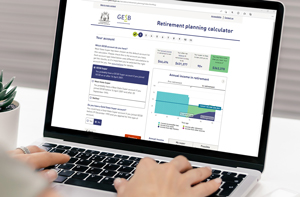Withdrawing your super in retirement
Once you've decided when to retire, you also need to choose how you want to take your super money.
How you choose to take your super will depend on whether you're likely to return to work, whether you'd like a regular income from your super and if you'd like to make lump-sum withdrawals.
Options for withdrawing your super
There’s more than one way you can access your super money, once you become eligible. Which option you choose will depend on your personal circumstances and retirement plans.
We recommend you see a financial adviser, accountant or tax adviser to help you decide which option is best for you.
Leave your money in your super account
You can make lump-sum withdrawals from time to time.
Open a Retirement Income Pension account
You can have a regular income stream paid to you.
Take your money as a cash lump sum
You can withdraw some or all of your money and close your account.
Be confident in your retirement plans
If you're feeling unsure, our Retirement Options Service provides tailored information to help you feel more confident in making your retirement plans.
Leave your money in your super account
If you have other income to support you in retirement or you’re still deciding what type of retirement income account is right for your needs, you could leave your money in your GESB Super or West State Super account. You can:
- Make lump-sum withdrawals of at least $1,000 when you need
- Continue to accumulate investment earnings
- Change your investment plan to suit your circumstances
- Keep the same super account if you choose to return to work
If you’re a Gold State Super member, you might be able to take advantage of tax benefits by transferring your super to your existing West State Super or GESB Super account, or we can open a new GESB Super account for you.
Open a Retirement Income Pension account
If you’d like a regular income stream from your super, our Retirement Income Pension could be a great way to access your money1. You can:
- Choose how much you're paid each year (subject to limits set by the Commonwealth Government)
- Receive payments directly into your nominated bank account monthly, quarterly or annually
- Invest your account balance in a choice of investment options
Our Retirement Income Pension account options:
RI Allocated Pension
If you're retired and want a regular income stream.
Transition to Retirement Pension
If you're still working and transitioning to full retirement.
What are the differences between a Transition to Retirement Pension and an RI Allocated Pension?
Our Retirement Income Pension can be taken as either:
- An RI Allocated Pension - a standard allocated pension product
- A Transition to Retirement Pension - a transition to retirement income stream that allows you to access your super as an income stream while you’re still working
Here’s a summary of the differences between the two pensions.
| Transition to Retirement Pension | RI Allocated Pension | |
|---|---|---|
| Lump sum withdrawals | You cannot make lump sum withdrawals | You can make lump sum withdrawals |
| Transfer balance cap | No transfer balance cap applies | A $1.9 million cap applies on the total amount of accumulated super that you can transfer to or hold in tax-free retirement accounts |
| Maximum pension amount | Maximum amount of 10% of your account balance can be drawn in a financial year (set by the Commonwealth Government) | No maximum amount applies |
| Tax on investment earnings | Tax is generally applied up to a rate of 15% and will be reflected in the unit price for each Transition to Retirement Pension investment plan | No tax applies to investment earnings |
Take a cash lump sum
You could take your super savings out and invest or spend it however you like. If you're considering this option, you need to understand the tax rules that apply.
A lump-sum withdrawal could be taxed at a higher rate than if you rolled the money into an allocated pension - so it's important to understand what will happen.
Taking your entire benefit as a lump sum will also close your super account.
How will your super be taxed?
It's important to understand the tax rules that apply when you withdraw your super. It varies depending on how you take your money out, as well as your age and the components of your super benefit.
Learn more about your super
The more you know about your super, the easier it is to manage and make informed decisions about your retirement savings.
Here's how you can learn more with us:

Register for a webinar
Choose a webinarLearn in the comfort of your own home by attending an online webinar.

Attend a retirement planning seminar
Choose a seminarIf you're just beginning to plan your retirement, you can attend an in-person seminar.

Use our calculators
Use a calculatorYou can use our range of calculators to help you take control of your super and plan for your retirement.
1 A $1.9 million transfer balance cap applies on the total amount of accumulated super that you can transfer into a tax-free retirement account, such as our RI Allocated Pension.
More information
- Find out more about our RI Allocated Pension
- Learn more about our Transition to Retirement Pension
- Read the Tax and super brochure
- Download the Accessing your super brochure
Need help
- Call us on 13 43 72
- Use Live chat
Thank you for printing this page. Remember to come back to gesb.wa.gov.au for the latest information as our content is updated regularly. This information is correct as at 27 April 2024.